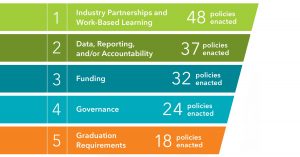February marks the release of the 2023 Year In Review, the 11th edition of this comprehensive report developed by Advance CTE in collaboration with the Association for Career and Technical Education (ACTE). Dedicated to providing a thorough overview of state Career Technical Education (CTE) policies, this report is valuable for state and local administrators and practitioners to better understand national trends and specific policy actions taken by individual state legislatures in 2023.
The policy tracking conducted for 2023 Year In Review totaled 115 policies implemented in 47 states. The report highlights innovative and practical legislation and emphasizes common policy themes. Notably, clean and renewable energy emerges as a prominent focus among policymakers, reflecting the emerging workforce demands of this sector while highlighting the dynamic landscape of CTE. Building upon the legacy of previous reports, the 2023 Year In Review offers insights into the top five policy areas in 2023:

“Industry Partnerships and Work-Based Learning” was the predominant policy category in 2023, with 48 policies enacted under this topic. This category first took the top spot last year after multiple years of the funding category being the most popular. Many policies in this category focused on engaging industry to drive student learning that addresses workforce needs. The following policies illustrate strategies that address labor shortage by fostering industry engagement and enhancing the learner experience through work-based learning opportunities:
Arkansas
S.B. 294 mandates the Division of Elementary and Secondary to establish career-ready pathways for high school diplomas. These pathways include rigorous academic courses and modern career and technical studies aligned with labor market needs, leading to industry credentials. These initiatives address labor shortages by ensuring that students are equipped with skills that meet industry demands through practical work-based learning experiences, thereby bridging the gap between education and employment.
Maryland
S.B. 104 creates the Apprenticeship 2030 Commission to expand registered apprenticeships in sectors with skill shortages. The goal is to increase registered apprenticeships to 60,000 by 2030 and have 45% of high school graduates complete high school-level apprenticeships. By fostering apprenticeships, the policy aims to provide career pathways for young people while addressing industry needs through hands-on training and mentorship, thereby reducing skills shortages.
Vermont
H.B. 452 establishes the Vermont Registered Apprenticeship Program to regulate apprenticeship programs aligned with industry demand. This program oversees apprenticeship, pre-apprenticeship, and youth apprenticeship initiatives. The policy directly addresses labor shortages through structured apprenticeship programs by preparing individuals with the specific skills demanded by industries, ensuring a better alignment between workforce supply and industry demand.
For a comprehensive exploration of the policies enacted this year, Advance CTE offers an accompanying online tracker. This tool empowers users to search and filter for specific legislation, providing a more in-depth understanding of the enacted policies.
The 2023 Year In Review strives to contribute to the ongoing dialogue on CTE, showcasing successful strategies, and fostering collaboration among stakeholders in the field. CTE leaders are encouraged to utilize the tracker and state highlights in their respective states and communities for more strategies to implement potentially innovative policies.
